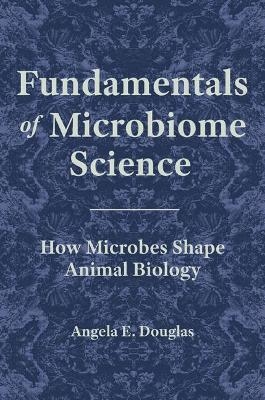
Fundamentals of Microbiome Science
Princeton University Press (Verlag)
978-0-691-16034-4 (ISBN)
An essential introduction to microbiome science, a new cutting-edge discipline that is transforming the life sciences
This book provides an accessible and authoritative guide to the fundamental principles of microbiome science, an exciting and fast-emerging new discipline that is reshaping many aspects of the life sciences. Resident microbes in healthy animals--including humans—can dictate many traits of the animal host. This animal microbiome is a second immune system conferring protection against pathogens; it can structure host metabolism in animals as diverse as reef corals and hibernating mammals; and it may influence animal behavior, from social recognition to emotional states. These microbial partners can also drive ecologically important traits, from thermal tolerance to diet, and have contributed to animal diversification over long evolutionary timescales.
Drawing on concepts and data across a broad range of disciplines and systems, Angela Douglas provides a conceptual framework for understanding these animal-microbe interactions while shedding critical light on the scientific challenges that lie ahead. Douglas explains why microbiome science demands creative and interdisciplinary thinking—the capacity to combine microbiology with animal physiology, ecological theory with immunology, and evolutionary perspectives with metabolic science.
An essential introduction to a cutting-edge field that is revolutionizing the life sciences, this book explains why microbiome science presents a more complete picture of the biology of humans and other animals, and how it can deliver novel therapies for many medical conditions and new strategies for pest control.
Angela E. Douglas is the Daljit S. and Elaine Sarkaria Professor of Insect Physiology and Toxicology at Cornell University. Her books include The Symbiotic Habit (Princeton) and Symbiotic Interactions.
Preface vii
1 Introduction: Animals in a Microbial World 1
1.1 What Is An Animal? 1
1.2 Terminology: Dismantling the Tower of Babel 3
1.3 The Microbiology of Animals 5
1.4 Scope of this Book 9
2 The Ancient Roots of the Animal Microbiomes 12
2.1 Introduction 12
2.2 The Social Life of Bacteria 13
2.3 The Multiorganismal Origins of Eukaryotes 20
2.4 The Ubiquity of Microbial Associations in Eukaryotes 23
2.5 The Animal Condition 29
2.6 Summary 36
3 The Microbiome and Human Health 38
3.1 Introduction 38
3.2 The Biogeography of the Human Microbiome 39
3.3 How to Study Microbiota Effects on Human Health 45
3.4 The Microbiota and Human Disease 55
3.5 The Mass Extinction Event Within? 60
3.6 Summary 64
4 Defining the Rules of Engagement: The Microbiome and the Animal Immune System 66
4.1 Introduction 66
4.2 Immune Effectors and the Regulation of the Microbiota 68
4.3 The Effects of the Microbiota on Animal Immune Function 76
4.4 Symbiont-Mediated Protection: Microbiota as the Second Immune System 84
4.5 Summary 91
5 Microbial Drivers of Animal Behavior 93
5.1 Introduction 93
5.2 Microbes and Animal Feeding Behavior 95
5.3 Microbial Arbiters of Mental Well-Being 102
5.4 Microbes and Animal Communication 112
5.5 Summary 118
6 The Inner Ecosystem of Animals 121
6.1 Introduction 121
6.2 The Abundance and Distribution of Animal-Associated Microorganisms 123
6.3 Ecological Processes Shaping Microbial Communities in Animals 127
6.4 Functions of the Inner Ecosystem 137
6.5 Summary 150
7 Evolutionary Processes and Consequences 152
7.1 Introduction 152
7.2 Costs and Benefits 153
7.3 Evolutionary Specialization and Its Consequences 164
7.4 Symbiosis as the Evolutionary Engine of Diversification 173
7.5 Summary 189
8 The Animal Reimagined 191
8.1 Introduction 191
8.2 The Scope of the Animal 192
8.3 The Determinants of Animal Phenotype 197
8.4 The Animal in the Anthropocene 200
References 207
Index 231
| Erscheinungsdatum | 16.04.2018 |
|---|---|
| Zusatzinfo | 76 b/w illus., 2 tables |
| Verlagsort | New Jersey |
| Sprache | englisch |
| Maße | 155 x 235 mm |
| Themenwelt | Naturwissenschaften ► Biologie ► Evolution |
| Naturwissenschaften ► Biologie ► Genetik / Molekularbiologie | |
| Naturwissenschaften ► Biologie ► Mikrobiologie / Immunologie | |
| ISBN-10 | 0-691-16034-1 / 0691160341 |
| ISBN-13 | 978-0-691-16034-4 / 9780691160344 |
| Zustand | Neuware |
| Informationen gemäß Produktsicherheitsverordnung (GPSR) | |
| Haben Sie eine Frage zum Produkt? |
aus dem Bereich


